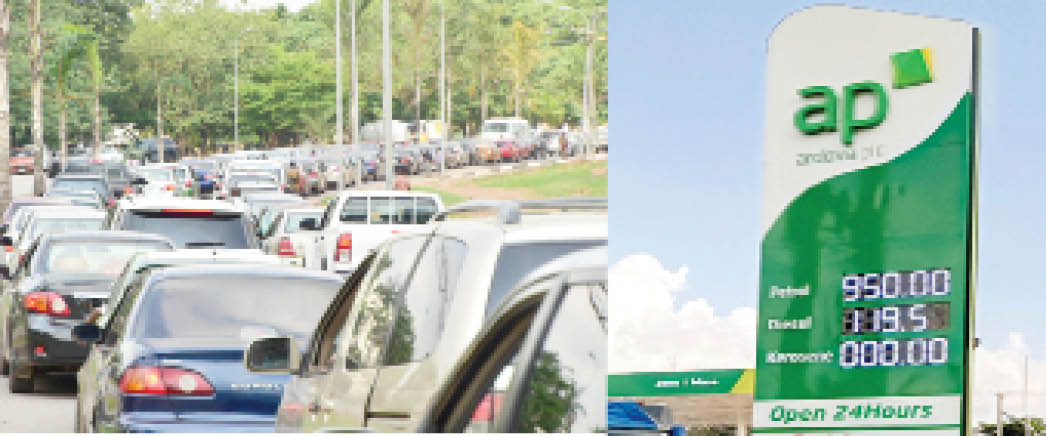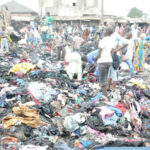The latest hike in the price of petrol has pushed up transport fares by over 50 percent in major cities across Nigeria, findings by Daily Trust have revealed.
The newest price hikes, implemented by the Nigerian National Petroleum Company’s (NNPCL) Retail Management, range from N855 to N897 per litre, depending on the location, from the previous N568-N617.
Independent marketers have adjusted their prices to between N930 and N1,200 per litre of petrol.
The price hike has had a widespread impact, with some Nigerians resorting to long-distance trekking and others missing work due to the higher transportation costs.
- 2027: We are working to bring Kwankwaso, Obi back into our fold – PDP
- Doyin Okupe: Why I dumped Obi for Tinubu
The pan-Yoruba socio-political organisation, Afenifere and the Peoples Democratic Party (PDP) on Wednesday joined the Nigeria Labour Congress (NLC) in demanding reversal of the increase in the petrol pump price.
This is even as the Manufacturers Association of Nigeria (MAN) warned that the price hike could lead to higher inflation.
Also yesterday, the National Association of Nigerian Students (NANS) announced plans to protest and shut down major cities from 15th of this month.
Abuja, Lagos commuters express frustration
Commuters in the Federal Capital Territory (FCT), Lagos and other states yesterday expressed frustration over the hike in the price of petrol which, according to them, has constrained their living conditions.
Many of them, who spoke to our correspondents, said the unaffordability of transportation cost had forced them to trek to work.
Adeolu Segun, a civil servant residing in Zuba, Abuja, said the fare from his area to Berger had risen from N1,000 to N1,500.
Mrs. Zainab Ibrahim, a mother of six living in Kubwa, said she paid N1,000 as fare as against the previous N500 for the same route.
Ismaila Danjuma, the Secretary of the Zuba branch of the National Union of Road Transport Workers (NURTW), explained that the rise in transport fares was due to the fuel price hike.
A passenger, Murjanatu Shehu, who was travelling to Kano from Abuja, said the fare rose from N8,000 to N11,000.
Haruna Yakubu, a driver on the Abuja-Lokoja route, confirmed fare increase from N4, 500 to N6,000; and Abuja-Okene routes fare rose from N6,500-N10,000.
Lagos bus drivers, Ojo Jamiu and Chukwuka Ogwu, said they now charge more than double as fares.
Kano, Rivers residents trek
In Kano and Port Harcourt, residents resorted to trekking.
Yakubu Isa, who said he used to pay N200 to go to Kano Guest Inn from Kwana Hudu, could not afford the new N400 fare, but had to trek. A teacher in Kano, Maikudi Haliru, also said he trekked to school to avoid the higher tricycle fares.
Our correspondent observed a low turnout of passengers at the Kano Line Motor Park yesterday as fares for the Kano-Kaduna and Kano-Abuja routes had risen to N6,000 and N12,000 respectively.
Some residents of Port Harcourt, Rivers State, also said the latest increase in transport fares had forced them to trek.
In Ondo State where transport fares have also doubled, residents said it would be better to trek a few distances to their workplaces.
In Jalingo, the Taraba State capital, tricycle fares have been increased by 50 percent; while same rose in Borno and Yobe states by 30 per cent.
Inflation figures may go up – MAN
The Manufacturers Association of Nigeria (MAN) has said that the new price of petrol might push inflation figures high, impacting household budgets. It also said Small and Medium-scale Enterprises (SMEs), which often operate on thin margins, could be hard hit by the development.
The MAN, in a statement by its Director-General, Segun Ajayi-Kadir yesterday, enumerated the impacts of the petrol price hike.
“So, in terms of what the impact might be and judging from what we have witnessed in the past, the cost of transportation may increase, and so would the prices of goods and services. As the cost of petrol rises, consumers will spend more on transportation and energy, leaving them with less disposable income.
“This decrease in purchasing power may lead to reduced demand for non-essential goods and services, affecting businesses across various sectors. These are pointers to the high possibility of a rise in inflation figures, impacting household budgets,” the DG said.
We’ll shut down major cities – Students
The National Association of Nigerian Students (NANS) has announced plans for a “large-scale” shutdown of all major cities in Nigeria over the fuel price hike, starting from September 15, 2024.
In a notification sent to students yesterday, Okunomo Henry Adewumi, President of the NANS’ Senate, demanded immediate reversal of the fuel price hike and the removal of Mele Kyari, the Group Chief Executive Officer of the NNPCL.
The statement said that the protest will be conducted peacefully and in accordance with the law.
Meanwhile, another faction of the NAN yesterday debunked the claim that the student union was planning a nationwide shutdown of major cities.
Akinteye Babatunde, the association’s factional Senate President, in a statement, said NANS did not announce nor endorse any such protest, describing the claim as baseless.
Afenifere, PDP demand pump price hike reversal
The pan-Yoruba socio-political organisation, Afenifere, yesterday urged the federal government to direct the NNPCL to reverse the increase in fuel pump price.
Afenifere asked the government to stick to the claim by the Minister of State for Petroleum, Heineken Lokpobiri, that it did not instruct the increase.
In a statement signed by Jare Ajayi, the spokesman of the Afenifere’s faction loyal to Pa Reuben Fasoranti, the group, said that Nigerians are currently going through a lot of challenges as a result of biting socio-economic crunch and the attendant hardships.
“It is therefore a wrong time to come up with any policy that will increase the undesirable challenges Nigerians are going through presently. Failure by the NNPCL to reverse the latest increment in fuel price will rub off negatively on some policies of Tinubu administration to ease things for the citizens. Policies such as the Students Loan Scheme and Consumer Credit Scheme that are just taking off”, it said.
Afenifere said with the latest increase in petrol price, the cost of fuel in Nigeria had risen by 460 per cent in 15 months.
It was curious that an organisation that declared a profit running into trillions of Naira could, almost in the same breath, claim indebtedness to the tune of nearly $7 billion. “Why not pay off the debt from the available fund before declaring it as profit?
“It is a common knowledge that the cost and availability of energy such as petrol, gas, electricity, diesel and kerosine are major factors not only in production and services but also on the quality of well-being that Nigerians can enjoy. Hikes in prices of these energy sources have astronomically increased the costs of services and commodities, reduced the disposal incomes of average Nigerians and heighten their health risk. The combination of all these are making a daily living an onerous task for the majority of the citizens. Considering the fact that millions of the Nigerians had been described as being ‘multi-dimensionally poor’, the recent hike in costs of fuel and electricity are uploading the number of people in that category phenomenally”, it said.
Similarly, the Peoples Democratic Party (PDP) yesterday condemned the hike in fuel price, alleging that it was a “brutal assault” on Nigerians by the ruling All Progressives Congress (APC).
The PDP said the increase is a “recipe for crisis,” particularly during a time of severe economic hardship under President Tinubu’s administration.
Debo Ologunagba, the party’s National Publicity Secretary, in a statement, urged President Tinubu to reverse the fuel price increase and reconsider other policies negatively impacting the nation.
He said with proper management, petrol should not cost more than N250 per litre.
He said the continuous rise in fuel prices, without consideration for the people’s welfare, was exacerbating the already dire economic situation, pushing millions of Nigerians further into poverty.
The PDP also alleged that over 150 million Nigerians had fallen below the poverty line, with businesses collapsing due to the high cost of living, a weakened naira and rising unemployment.
Tricycle riders protest fuel price hike in Delta
Tricycle riders in Warri South Local Government Area of Delta State yesterday protested the petrol price hike, disrupting business activities and vehicular movements.
They blocked the Deco Road Junction, the First-Marine Gate Junction and the popular Hausa Quarters, Igbudu.
TUC asks govt to rescind decision
The Trade Union Congress of Nigeria (TUC) on Wednesday criticized the federal government for the recent hike in the pump price of petrol, demanding its immediate reversal.
TUC President Festus Osifo, in a statement, said the union expressed deep concern that the sudden increase in fuel and electricity costs would exacerbate poverty levels, worsen the suffering of citizens and potentially lead to social unrest.
Osifo criticized the government for implementing the price increase without consulting key stakeholders, calling it a blatant disregard for the welfare of the Nigerian people, particularly the working class who are most affected by such decisions.
“The news of the PMS price hike has sent a wave of apprehension and depression across the nation, especially as it comes on top of existing hardships faced by citizens,” he said.
He said the TUC was also concerned about the recent 250% increase in electricity tariffs, labelling it as an additional burden on the poorest in society and a sign of the government’s lack of empathy for ordinary Nigerians.
Tinubu didn’t bargain fuel price for minimum wage-Presidency
The Senior Special Assistant to the President of Media (Print), Abdulaziz Abdulaziz, Wednesday on his X, said Tinubu never bargained with the leadership of the Nigerian Labour Congress (NLC) not to increase the price of petrol before arriving at N70,000 as the new minimum wage.
He was reacting to the allegation by the NLC’s president, Joe Ajaero, that Tinubu asked them to accept N70,000 as minimum wage for the petrol price to remain N617/litre.
Abdulaziz said: “I sat through the two meetings President @officialABAT had with labour leaders on minimum wage. At neither of the meetings was an offer made in exchange for a fuel price hike. Ajaero is once again playing his dirty politics with the emotions of Nigerians.”
In his reaction yesterday, Ajaero, through the NLC’s spokesman, Benson Upah, said, “As for Abdulaziz’s side-dig, he should stop insulting the intelligence of Nigerians as they do not need Comrade Joe Ajaero to know they have been taken for a ride and that life has never been this mean, all due to the policies of government.”
By Abdullateef Aliyu (Lagos), Baba Martins, Adam Umar, Abubakar S. Isah, Idowu Isamotu (Abuja), Ahmad Datti, Salim I. Umar (Kano), Victor Edozie (Port Harcourt), Magaji Hunkuyi (Jalingo), Eugene Agha, Peter Moses, Fagbemi Samuel (Lagos), Kelvin Meluwa (Asaba), Habibu I. Gimba (Damaturu) & Olatunji Omirin (Maiduguri)

 Join Daily Trust WhatsApp Community For Quick Access To News and Happenings Around You.
Join Daily Trust WhatsApp Community For Quick Access To News and Happenings Around You.



